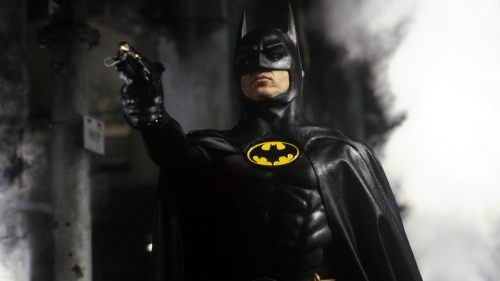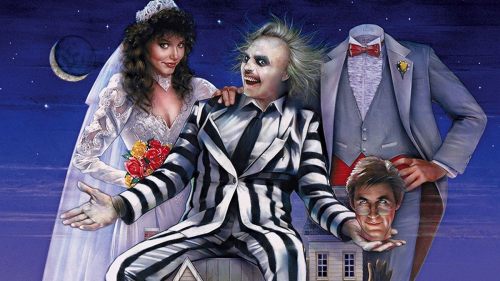Tim Burton’s Peculiar Whiteness
Tim Burton stepped in it this week with some truly dumb, shallow comments about diversity and representation in media. He was asked this because his new movie, Miss Peregrine's Home For Peculiar Children, is an overwhelmingly Caucasian affair, with only one black role. Here's what Burton said:
"I remember back when I was a child watching ‘The Brady Bunch’ and they started to get all politically correct. Like, OK, let’s have an Asian child and a black. I used to get more offended by that than just… I grew up watching blaxploitation movies, right? And I said, that’s great. I didn’t go like, OK, there should be more white people in these movies.”
I don't have the energy or the interest to pick these words apart - they're just dopey - but I want to ask how he was allowed to say that. I want to figure out how, when releasing a movie as white as this one into theaters at this moment in time, did no one coach Burton on some talking points about diversity? I want to look at where the real failing is here, and I don't think it's in Tim Burton making a movie full of white people.
Miss Peregrine is actually very good, and I enjoyed it quite a bit, but if you wanted to synopsize it in the most uncharitable way possible you would say it's about a group of white people hiding from the world and trying to keep a black guy away from their perfect version of 1943. The optics on this movie are stunning - the bad guy is black and he's the only black guy in the whole thing. He's traveling the world invading the spaces of little white children and killing them. It's troubling imagery, and it's troubling that at no point in the process did anyone involved notice.
That is the problem. It's the same problem that extends to Fox not coaching Burton on how to handle this question while doing press: nobody involved saw it coming.
Tim Burton is, like him or not, an artist. As such that means he has one duty, and one duty only - to his art and his vision. If that art and vision is about white people exclusively, well, that's his right. As a storyteller he doesn't owe us a reflection of the world we want to see, he only owes us the world he sees. He doesn't owe us a moral universe on screen that matches up with what we desire; we can certainly talk about and critique and analyze the moral universe he does show us, but that's about it. We don't really get to tell Tim Burton what we want from his movies when it comes to morals or representation or diversity. They're his stories, and if we don't like the way he's telling them our option is to just not listen.
But there's another layer to all of this. Making movies is an art, but it's also inextricably a business. It isn't like painting, where the cost of production is low enough that you can happily spend the rest of your life slapping paint on canvasses and never selling one. The time and effort involved in making a movie like Miss Peregrine's is such that there's a constant economic factor at play. This is where the age-old tension between filmmaker and studio lives - the filmmaker wants to get across his vision and the studio wants to make a buck. Sometimes those two goals are in alignment, but very often they're at odds. We don't always like it - we often bristle at stupid studio execs meddling in the visions of auteurs - but that's how the system works. And it's how the system didn't work when it came to Miss Peregrine.
While Burton doesn't owe you any morality, Fox as a company does. We should demand that the companies that make money from us behave as good corporate citizens, and part of that good corporate citizenry is reflecting the diversity of the world around them. That should happen not only on screen but also behind the scenes, and the fact that nobody at Fox noted the optics of Miss Peregrine shows just how much big studios are not diverse behind the scenes. The release of this movie in this form makes me believe that a lot of white people looked at it and gave it a pass because it literally never occured to them that it was weird. They're not racists, but they're engaging in unconscious institutional racism. That's why you need representation behind the scenes - to bring different perspectives. It's why we've been so aggressive about finding and hiring diverse freelancers at this site and our magazine - we have a white male POV down pat, and it's important that we bring other perspectives to our writing.
More than morally imperative, diversity is good business, and Fox is being a bad business by letting Burton's vision sail through untouched in its bleachiness. They're not keeping up with the times, or with the changing face of the audience, and it's foolish. Studios try to make movies that hit four quadrants, but they continue trying to just hit the white market and assume other races will tag along to see whatever is big that weekend. That thinking may work right now - Miss Peregrine is opening at number one with $28 million - but it is running out of steam, and soon enough a lily white movie like this is going to not only look ridiculous, it's going to be box office poison.
This puts me in the weird position of advocating the studio tinker with Burton's vision. That's not an easy path to go down, but at the same time it's the nature of the system that is in place; if Burton wanted to include copious amounts of gore in this PG-13 movie the studio wouldn't allow it. They wouldn't let Eva Green get fully nude, or allow Samuel L Jackson to keep dropping 'motherfucker' into his dialogue. I suspect the studio wouldn't have given Burton his budget if he wanted to make this whole movie with monkeys, Lancelot Link style (although that would have been amazing). They wouldn't have made this movie without at least a couple of marketable names in the credits, and is that all that different from demanding there be a couple of faces of different color in there as well? This isn't asking Burton to shoehorn in characters or vehicles to sell toys.
I've written about this before, and I suspect I'll write about it again, but I just see people asking the wrong questions again and again. Instead of asking Tim Burton why he doesn't cast black people, we should be asking Fox why they greenlit the movie with this cast. Burton's vision is his own, and whether we like it or not we have to accept it if we value artists (we don't have to watch it). But the studio that is paying to realize that vision doesn't owe him a platform. Part of their job is to bring his vision to life in a way that will appeal to the widest audience, and urging him to be more diverse is only in their own best interests.
As for that Brady Bunch quote: I just got nothing. Maybe out of touch middle aged rich white dudes should speak less on these subjects.



